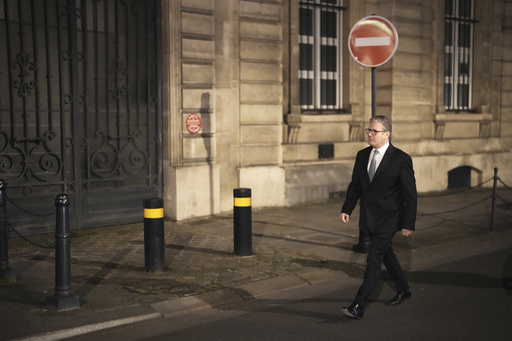
PARIS — French President Emmanuel Macron aimed to showcase a semblance of unity among European nations by inviting select leaders to the Élysée Palace, as the Trump administration pursued direct talks with Russia regarding the conflict in Ukraine, effectively sidelining European interests. The central question remains whether Europe can take the initiative in its own security or will continue to respond to decisions made by the U.S. and Russia.
The continent is grappling with divergent strategies, as Macron’s advocacy for a European-led defense contrasts with various stances from leaders such as Keir Starmer with his “third way” diplomacy, Giorgia Meloni’s attempts to balance between Brussels and Washington, and Olaf Scholz’s commitment to NATO. All these factors illustrate Europe’s internal divisions as it contemplates its future actions.
In France, Macron is striving to position himself as the primary voice in discussions surrounding Ukraine and European security. By organizing the summit at his Parisian residence, he seeks to consolidate his leadership role at a time when Germany’s Scholz is facing political challenges, the U.K. has distanced itself from the EU, and Italy appears to lean towards Trump’s isolationist policies. Macron’s influence is bolstered by his presidential term, which runs until 2027, and by France being the EU’s sole nuclear power. His proposal for establishing European “security guarantees” is part of a larger vision for reducing dependency on the U.S.
However, achieving a unified consensus has proven to be challenging. Germany is hesitant, significant frontline EU nations were not included in the summit discussions, and Trump’s unpredictable behavior adds complexity to Europe’s security landscape. As noted by French political analyst Jean-Yves Camus, “Macron has sought to impose himself as Europe’s strongman.”
Across the Channel, Keir Starmer is advocating for a distinct strategy, attempting to serve as the conduit between Europe and Washington while maintaining a steadfast support for Ukraine. Following a meeting with Trump prior to the elections, where Trump expressed admiration for Starmer, the British prime minister plans to visit Washington in the coming week. This visit is seen as a potential effort to reconcile U.S. and European interests, underscoring the classic “special relationship.”
While Trump appears to favor a de-escalation approach in Ukraine, Starmer is reinforcing his commitment to Kyiv by declaring that the U.K. is prepared to deploy troops if necessary once a peace agreement is reached. This positions him in stark contrast to the more restrained perspectives of Macron and Scholz. Additionally, Starmer’s recent choice not to endorse a significant international declaration regarding the future of artificial intelligence—aligning more closely with the U.S. than the EU—has raised eyebrows regarding Britain’s evolving stance on broader geopolitical matters.
“The U.K. is unique in that it’s practically the only major ally that Trump hasn’t purposefully antagonized since his inauguration,” commented Anand Sundar, an advisor at the European Council on Foreign Relations. He noted that the Starmer administration is making concerted efforts to avoid becoming a target of U.S. criticism. Some analysts speculate that Starmer may be positioning himself as Trump’s “whisperer,” capable of influencing the U.S. administration while still aligning with European sentiments.
In Italy, Giorgia Meloni, known for her ties to Trump and the only major European leader to attend his inauguration, expressed skepticism during her late arrival at the Paris summit. She left without making a public comment, indicating her doubts regarding the meeting’s significance. Reports suggest Meloni questioned the venue of the summit—Paris instead of Brussels, the recognized hub for EU decision-making—criticizing the absence of key frontline countries such as the Baltic nations, Finland, and Sweden.
During the summit, Meloni voiced her opposition to deploying European troops in Ukraine, labeling it “the most complex and least effective option” unless clear security guarantees for Kyiv are established. She echoed sentiments from U.S. Vice President JD Vance regarding Europe’s reliance on American security, stating, “We shouldn’t be asking what the Americans can do for us, but what we must do for ourselves.” Despite her reservations, Meloni participated in discussions, highlighting Italy’s apprehensions about long-term European military obligations.
A notable absence at the Paris meetings was Hungarian Prime Minister Viktor Orbán, who maintains cordial relations with Trump and often criticizes EU policies. While no formal reason was provided for his exclusion, some analysts interpreted it as a deliberate signal from Paris and other European allies regarding their stance toward leaders perceived to be too sympathetic to Russian President Vladimir Putin’s views.
In Germany, Scholz openly expressed his discontent with Macron’s ideas for a European-led security initiative in Ukraine, branding them as “completely premature” and unsuitable given the current conflict. Scholz displayed irritation, stating he was “a little irritated” by the mere discussion of peacekeeping forces “at the wrong time,” affirming that NATO should remain the cornerstone of security rather than pursuing an independent European military force.
Historically, some argue that Germany has been willing to cede leadership in European security matters to France, particularly in light of past world wars. This dynamic has been a long-standing framework that French leaders, starting from Charles de Gaulle, have pursued. Concurrently, the conversation around military expenditures is intensifying, as NATO officials now consider the alliance’s 2% GDP target as a baseline expectation rather than a limit.

